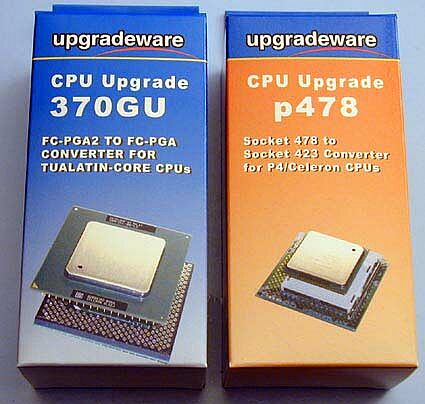New Processors On Old Boards: Adapters From Upgradeware for Socket 370 and Socket 423
Introduction
"There's no stopping progress" - this is the philosophy that continues to bring users ever faster and better performing products with increasing frequency. It is not always cause for rejoicing, because even expensive high-end PCs become obsolete after just a few months - even if they still work just fine.
There was a time, up until the end of the '90s, when available systems were often too slow to run many applications. Today the opposite is true: almost all standard applications can be run on commercially available machines at an acceptable speed. Only applications for areas such as 3D design still give today's PCs a real workout.
Responsible to a significant degree for this reversal of the trend was, among other reasons, the deepening battle between Intel and AMD. Since the introduction of the Athlon K7, Intel has had to do more and more to defend its monopoly. In fact, it's quite fair to ask whether processors beyond the 2 GHz barrier would be available at all today if it weren't for AMD.
That would all be well and good if it wasn't for the annoying platform change brought about by the introduction of new processors. It means that Pentium II, Pentium III and Pentium 4 all require different sockets - not to mention the variations within processor families.
Intel's launch of the Pentium III with Tualatin core (from 1.2 GHz) was a real slap in the face for the simple reason that, although it used the same physical socket as its predecessor the Coppermine, it required a slightly different pin layout. That meant that anyone who wanted it was forced to purchase a new motherboard in the bargain. It was a similar story when the first Pentium 4 came out for Socket 423, which Intel from day one determined would have a life span of no more than a few months. That was indeed what happened, because all Pentium 4 systems with the current Socket 478 available today are incompatible with its predecessor.
The manufacturer Upgradeware promises substantially longer life expectancy for systems with Socket 370 (pre-Tualatin) and Socket 423 platforms, since its adapters enable modern processors to be operated on relatively older motherboards.
Get Tom's Hardware's best news and in-depth reviews, straight to your inbox.

Patrick Schmid was the editor-in-chief for Tom's Hardware from 2005 to 2006. He wrote numerous articles on a wide range of hardware topics, including storage, CPUs, and system builds.
